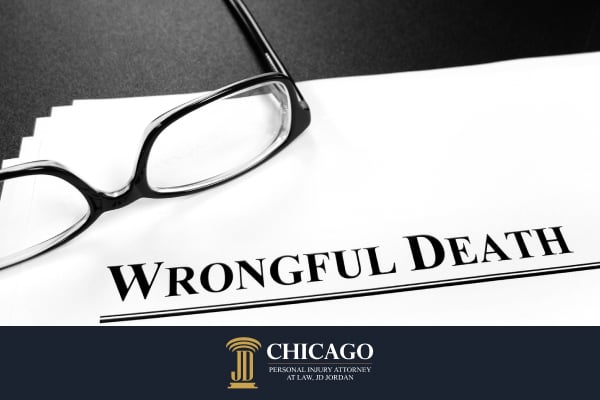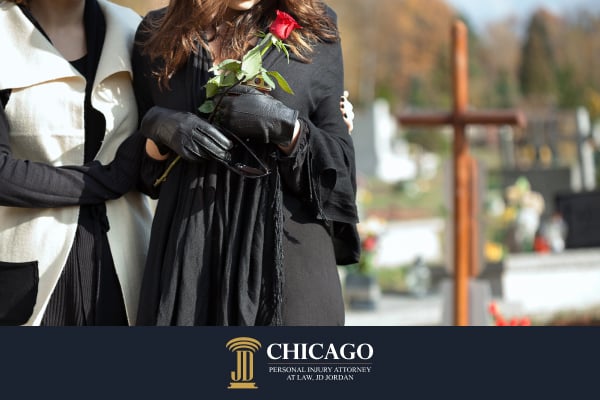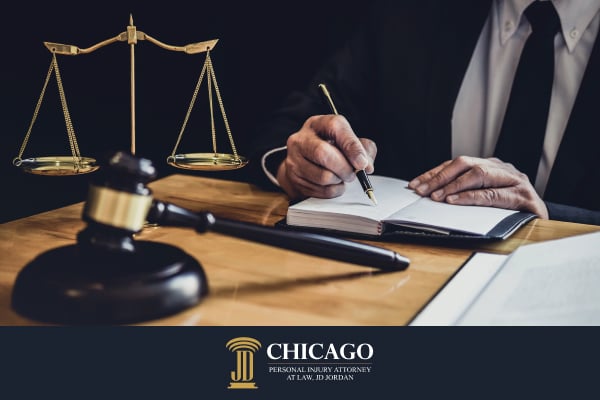



The team at Chicago Personal Injury Attorney at Law helps families who have lost loved ones due to others' careless actions. Our Chicago Wrongful Death Lawyer group brings countless years of combined experience to these sensitive cases. We understand the deep pain and financial stress that follows an unexpected death. Our wrongful death attorneys handle all legal matters so you can focus on healing and honoring your loved one's memory.
Families dealing with grief often miss important legal deadlines that limit their right to seek compensation. Insurance companies know this and may pressure you to accept quick settlements far below what your case is truly worth. Our wrongful death lawyer will protect your rights while you focus on the emotional needs of your family.
The legal system can seem cold and complex during this painful time in your life. We handle all paperwork, investigations, and negotiations with insurance carriers so you don't face added stress. Our law firm treats every family with compassion while fighting aggressively to hold negligent parties fully accountable for the harm they've caused.

Under Illinois law, wrongful death occurs when someone dies due to another person's negligent actions, recklessness, or intentional harm. These cases arise from many situations, including car crashes, medical mistakes, workplace accidents, and defective products. The key factor is that the death could have been prevented if the responsible party had acted with proper care.
Illinois law treats wrongful death as a civil matter, separate from any criminal charges that might apply. This means families can pursue financial compensation even if no criminal case exists or if criminal charges resulted in an acquittal. The wrongful death statute allows survivors to seek money for both economic losses, like medical bills and lost income, as well as non-economic damages, like grief and loss of companionship.
Successful wrongful death claims require proving the same four elements as other negligence cases: duty, breach, causation, and damages. First, we must show the defendant owed your loved one a duty of care, such as a driver's duty to obey traffic laws or a doctor's duty to provide proper treatment. Then, we must prove they breached this duty through careless actions or failure to act appropriately.
The most complex element often involves proving that this breach directly caused your loved one's death rather than some other factor. We work with doctors, accident reconstruction experts, and other professionals who help establish this crucial link. Finally, we document all economic and emotional losses your family has suffered due to this death, from medical and burial expenses to the profound loss of companionship, guidance, and support your loved one would have provided.
Wrongful death can result from countless situations where someone fails to exercise proper care for others' safety. The most common causes we handle include vehicle crashes, medical errors, workplace accidents, criminal acts, and dangerous property conditions.
Violent crimes like shootings, stabbings, and assaults lead to many wrongful death cases each year. Property owners and businesses may share liability when crimes happen due to inadequate security measures. For example, apartment buildings, hotels, and shopping centers must provide reasonable safety precautions in areas with known crime risks.
Families can pursue civil wrongful death claims regardless of whether the perpetrator faced criminal charges or was convicted. The civil case uses a lower "preponderance of evidence" standard than criminal courts, making it possible to win even when criminal charges weren't filed or didn't result in a conviction.
Fatal car crashes often result from speeding, drunk driving, distracted driving, or other traffic violations. These preventable accidents leave families devastated when a loved one leaves home and never returns. Truck accidents cause particularly catastrophic injuries due to the massive size difference between commercial vehicles and passenger cars.
Multiple parties may split liability in these cases, including negligent drivers, employers of drivers who were on the job, vehicle manufacturers if defects contributed to the crash, and sometimes government agencies responsible for unsafe road conditions. We investigate comprehensively to identify all possible sources of compensation, especially important when victims had dependents relying on their income.
Medical malpractice causes thousands of preventable deaths each year through surgical errors, medication mistakes, misdiagnosis, and failure to treat serious conditions. Healthcare providers must follow established standards of care when treating patients. When they fall short of these standards and death results, families deserve answers and compensation.
These complex cases require extensive medical knowledge and expert testimony to prove that the provider's actions directly caused the death. Our firm works with respected medical experts who review records and explain exactly how the standard of care was violated. We handle cases against individual doctors, hospitals, nursing homes, and other healthcare facilities.
Construction accidents, industrial mishaps, and exposure to toxic substances lead to many worker deaths each year. Some industries like construction, manufacturing, and mining have particularly high fatality rates. While workers' compensation typically limits lawsuits against employers, third parties like contractors, property owners, or equipment manufacturers often share responsibility.
Fatal workplace accidents require special investigation to identify all contributing factors and responsible parties. Our team looks beyond workers' compensation to find all sources of liability, from general contractors who failed to enforce safety rules to companies that made defective equipment. These additional claims often provide much more compensation than workers' comp death benefits alone.
Fatal falls most commonly affect elderly victims, who may suffer head injuries or hip fractures that lead to complications. These deaths frequently occur in nursing homes, hospitals, stores, and other properties with dangerous conditions like wet floors, poor lighting, or broken stairs. Property owners have a legal duty to maintain safe premises for visitors and residents.
Proving negligence in these situations requires demonstrating that the property owner knew or should have known about the hazardous condition but failed to fix it or warn about it. We gather evidence like maintenance records, security camera footage, and witness statements to establish how long the hazard existed before the fatal fall. This timeline helps prove the owner had reasonable time to address the danger.

Illinois law limits who can file wrongful death lawsuits to specific family members through the deceased person's estate. The personal representative (executor) of the estate must submit the actual lawsuit, acting on behalf of surviving family members. This representative is often named in the will or appointed by the court if no will exists.
The primary beneficiaries in wrongful death cases include the spouse and minor children of the deceased. Adult children, parents, and siblings may also recover damages, with the distribution based on each person's level of dependency and relationship with the deceased. Illinois courts consider many factors when dividing settlements, including financial dependency, the closeness of the relationship, and whether minor children are involved.
Wrongful death damages include both economic losses with specific dollar values and non-economic damages for emotional suffering. Economic damages cover medical expenses from the final injury or illness, funeral and burial expenses, lost income the deceased would have earned, and the value of services they provided to the family. We work with economic experts to calculate the full lifetime value of lost earnings, benefits, and household contributions.
Non-economic damages address the profound emotional impact of losing a family member. These include loss of companionship, guidance, and emotional support that the deceased would have provided. Illinois recognizes these intangible losses as real damages deserving compensation, though they're harder to assign a dollar value. Our experience with similar cases helps us present compelling evidence of these losses, often the largest part of wrongful death settlements.

In Illinois, you generally have two years from the date of death to submit a wrongful death lawsuit. Some exceptions exist, such as cases involving government entities (one-year limit) or cases where the death resulted from violent intentional conduct (five years).
The court distributes wrongful death settlements based on each family member's dependency on the deceased and their relationship. Spouses and minor children typically receive the largest portions, with the judge making the final determination about fair distribution.
Yes, you can file a wrongful death claim even if no criminal charges were filed or if the defendant was found not guilty in criminal court. Civil cases use a reduced standard of proof ("more likely than not" rather than "beyond reasonable doubt") and focus on financial compensation rather than punishment.
Stay-at-home parents, children, retirees, and others without traditional income still have substantial case value. We calculate the economic value of household services, childcare, guidance, and emotional support they provided, which would cost significant money to replace.
Most wrongful death cases are settled before trial, but we prepare every case as if it will go before a jury. Having a lawyer with trial experience often leads to larger settlement offers from insurance companies that want to avoid the risk and expense of court.

Let Chicago Personal Injury Attorney at Law help your family through this difficult time with compassionate, effective legal representation. Our experienced team offers free consultations where we'll listen to your story and explain your legal options clearly. Call us today to speak with a wrongful death lawyer who will fight to honor your loved one's memory through justice.
